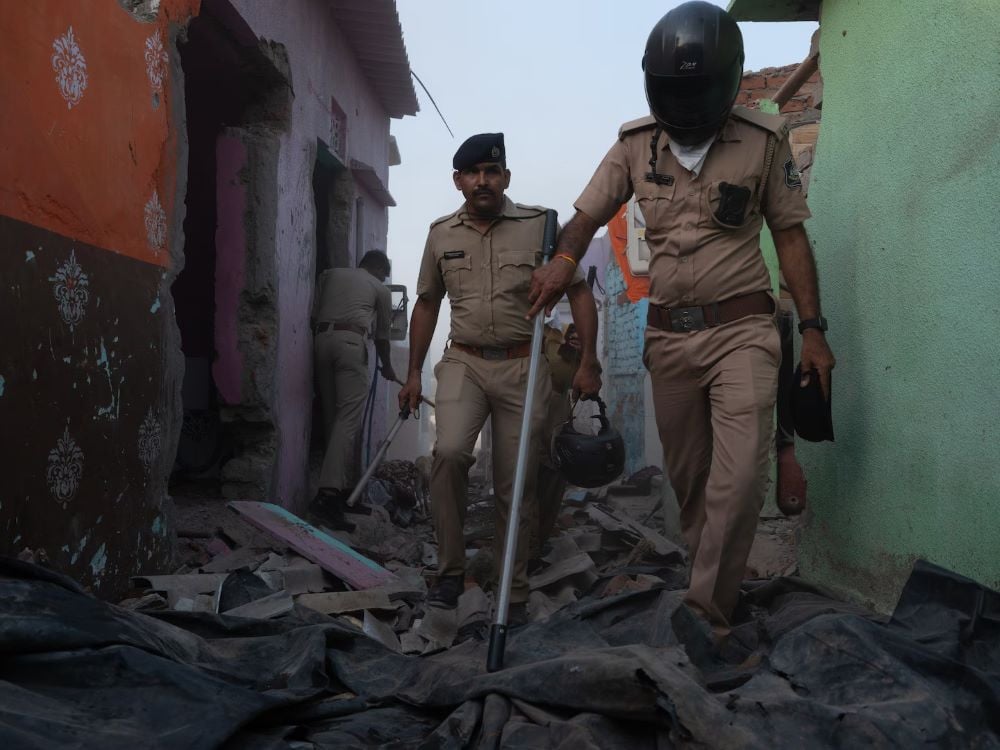Following a deadly militant attack on the cashmere, the Indian authorities launched an expulsion campaign targeting Muslims, expelling nearly 1,900 people in Bangladesh, many without legal process, according to a report The Washington Post.
Testimonies and documents indicate that some deportees were even Indian citizens. The victims describe police brutality, the destruction of identity papers and the forced deportation by the sea or the foot. Human rights groups and legal experts condemned the will as a clear violation of international law.
Hasan Shah, a Gujarat waste picker in India, woke up with a nightmare in April. Traged with his bed by the police, his eyes blindfolded and attached, he was taken by force at sea and ordered under the threat of a firearm in the water near the Côte du Bangladesh. “Jump in the water,” he recalls that the officers told him. “If you look back, we will pull you out.”
‘Keep Muslims online’
“Jump in the water. If you look back, we shoot you. ” – Indian police officers from Hasan Shah, an Indian Muslim, born in Gujarat
👺The documents proving that his Indian citizenship were torn off by police when they owned him in his hometown, Surat. pic.twitter.com/adgbgt5kid
– 𝑪𝒂𝒕𝒂𝒍𝒆𝒚𝒂🛡 (@ catale7a) July 12, 2025
Three days later, Shah swam on the ground and was picked up by the Bangladesh Coast Guard near Satkhira. His documents proving Indian citizenship have been confiscated, leaving him apatonnated and blocked. “It’s not my house,” said Shah, standing in front of a courthouse. “I need to go back to India. I have to come back to my children. “
Shah is one of the nearly 1,900 people – mainly Muslims – who were expelled from India to Bangladesh between May 7 and July 3, according to confidential data from the Bangladais government.
These expulsions followed a militant attack in cashmere in April which left 26 dead. In the days that followed, the Indian authorities launched raids, demolitions and deportations in the Muslim majority districts, in particular in Gujarat and Assam.
Arbitrary arrests and statelessness
The Minister of the Interior of the State of Gujarat, Harsh Sanghavi, said a repression of “each infiltrator”. While some detainees were undocumented, others like Shah seemed to be Indian citizens, some even holding voter identifiers and national identity cards.
The Shah family provided the Washington Post with evidence of their Indian citizenship, including verified identity documents and the recording of voters. His mobile phone, necessary to authenticate these documents, would still be held by the police.

Eleven deportees interviewed said they were denied the opportunity to present proof of their legal status. Several have indicated that their original papers had been seized or destroyed, and copies they provided later were rejected as false.
Human rights concerns
Human rights experts are alarmed. “The expulsion campaign not only violates civil rights,” said Mohin Alam Bhat, professor of law at Queen Mary University in London. “It clearly violates international law.”
The video evidence obtained by the post show disturbing scenes, including an elderly woman begging for not being left through the border of Bangladesh. It has been readily rewarded in India but has since disappeared.
Bangladesh has issued diplomatic demonstrations. The Indian Ministry of External Affairs and Border Security Forces has not responded to requests for comments.
Mass raids, demolitions and abuses
In the Ahmedabad Lake Chandola Lake region, 890 people, including more than 200 women and children – were detained during a raid at the end of April. Many have been forced to walk for hours in extreme heat while the media filmed the operation. More than 12,500 houses were at Bulldozer following, moving thousands.
Parveen Ismail Rangrez looked at his house destroying. “Everything is wiped out now,” she said.
Yunus Khan Pathan, another resident, was arrested, walked until the soles of his feet burn and release – only to come back and find his home disappeared. “Prove that I am a terrorist,” he said. “All I have is a Muslim name.”
The popular union for civil liberties has only estimated 50 of detained persons can lack legal status. Public dissent was limited due to the fear of being labeled “anti-national”.
“Public opinion is:” They keep Muslims online, “said Mujahid Nafees, secretary general of the chapter of Gujarat de Pucl
Torture and forced confession
Abdur Rahman, 20, was arrested without a mandate at 4 a.m. on April 26. He alleged that he was whipped with a leather belt in detention and put pressure on to falsely assert Bangladessee nationality.
“They beat me suddenly,” he said, showing deep purple bruises on his chest. Like Shah, he was given a life jacket and forced over board near the Sundarbans.
Rahman’s identity card and the school certificate – verified by the position – he was born in Ahmedabad.
“You want a whole group to disappear,” said Rudabeh Shahid, a non -resident scholarship holder of the Atlantic Council. “I have no other way to describe this.”
Nocturnal deportations through land borders
India also deports prisoners on foot. According to Lieutenant-Colonel Mehedee Imam, a commander of the Bangladais borders, the Indian forces turn off the spotlight and calmly force people in the not of the night.
“It’s illegal,” said Imam. “There is a process in place to verify nationality.”
A video shows a woman sobbing in a blue sari, begging not to be abandoned: “I have only one life.” She has been briefly readed in India, but has since disappeared. Her son Abdul Suban said, “I don’t even know if she is alive. How does it happen?”



